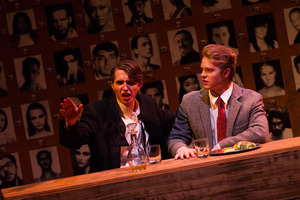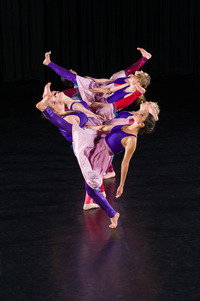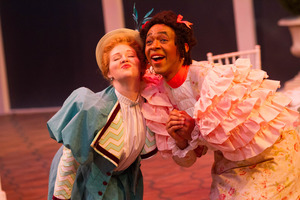Frequently Asked Questions
- Q: Who performs in the plays and dance concerts?
- A: The actors and dancers in the plays and dance concerts are primarily Gustavus students selected in auditions open to all Gustavus students. Performance opportunities are not limited to majors; in fact, non-majors frequently out-number theatre and dance majors in any production.
 Q: What are auditions for plays like and when are they?
Q: What are auditions for plays like and when are they?- A: Auditions usually take place during the first week of each semester, although occasionally auditions for an early spring term production will be held before the end of fall term. Students who might be interested in auditioning are encouraged to read the play before the audition and usually to prepare a short monologue of their own choosing. Specific audition information is posted prior to the audition dates. Every fall audition workshops for first year students are held as part of orientation.
- Q: What are auditions for dance concerts like and when are they?
- A: Auditions for dance concerts usually take place the second week of the semester. Students need not prepare any material prior to the auditions. Students should arrive at the scheduled audition dressed in dance clothing, warm-up and prepare to learn combinations taught by the choreographers.
- Q: Can first year students get into plays or the dance company?
- A: Yes. Auditions are open and the person best suited to the role or position gets it.
- Q: Can a major be involved in more than one mainstage production a year?
- A: Yes. The plays in the fall are cast from the same auditions. Students are in one show or the other. The spring shows are often cast through different auditions and it is sometimes possible for students to be in both.
- Q: Can a major still participate with choir or band?
- A: Yes, although it is difficult. Both theatre and music are demanding. The band ensemble practices typically conflict with theatre rehearsals. Choir practices tend to not conflict with evening rehearsals, but touring dates may conflict with rehearsals and performances. Every effort is made by the Music Department and the Theatre and Dance Department to arrange schedules in such a way as to allow multiple participation, but sometimes it is necessary for students to make a choice to be involved in music or theatre/dance.
 Q: Can one double major in both dance and theatre or with a major outside the department?
Q: Can one double major in both dance and theatre or with a major outside the department?- A: Yes. It is possible to double major in theatre and dance or combine a theatre or dance major with a major from a different department.
- Q: I’m interested in film. Are there classes here?
- A: The department does not regularly offer classes in film but our Communication Studies department offers classes in Film and Video. Occasional opportunities exist in student-directed films.
- Q: Who pays for the productions?
- A: Believing that exposure to quality drama and dance is integral to a liberal arts education, the college funds the productions through student tuition. Students, faculty and staff are admitted to all departmental productions free of charge.
- Q: How are the plays selected?
- A: The plays are selected by the faculty n the Theatre and Dance Department. A typical season balances comedy and tragedy, classic, modern and original plays. Suggestions from students, faculty, and staff are welcomed.
- Q: Who choreographs the dance concerts?
- A: A student choreographer’s evening is presented in the fall term in the Kresge Dance Studio. This concert is choreographed, designed and performed entirely by students. In the spring, students have the opportunity to perform in and occasionally choreograph and/or design a formal dance concert in Anderson Theatre or Gardner Theatre. This concert features the choreography and scenic, lighting and costume designs of faculty and professional guest artists.
 Q: Who builds the scenery and creates costumes for the productions?
Q: Who builds the scenery and creates costumes for the productions?- A: Students are encouraged to volunteer to help build scenery and costumes. Students approved for work-study may be assigned to work in the theatre. Some theatre classes require students to put in lab time working on the plays. If you’re interested in working in the scene or costume shop as student employment or for the sheer joy of it, talk to the Theatre Technical Director.
- Q: How can a student benefit from being involved with Theatre and Dance at Gustavus?
- A: The philosophy of the Department of Theatre and Dance is based on the fundamental belief that theatre and dance have the power to change lives. The study of Theatre and Dance can connect us with past times and other cultures – giving a heartbeat to the dry facts of time, place, and custom. Participating in works of theatre and dance engages the student on many levels. Through a process of embodied learning, students have the opportunity to act on their ideas, to empathize with the experiences of others, and to revisit their own beliefs, biases and assumptions of truth. While we are not a conservatory of theatre or dance, the department believes strongly in teaching the fundamentals of theatre/dance craft and discipline. Just as important, however, is our commitment to encouraging independent imagination and creativity among our students. We are determined to foster the development of “thinking” dancers, choreographers, actors, directors, and designers.
- Q: How do I go about getting involved with Theatre and Dance at Gustavus?
- A: We welcome all Gustavus students who wish to participate in the production of plays and dance concerts. One way to get involved is to audition; another is to volunteer to crew a show or dance concert or to work in one of the shops. Or you might consider taking a course – Acting I and a beginning dance technique class provide good introductions to what goes on in our world. For more information on how to become active, talk to any of the faculty members.